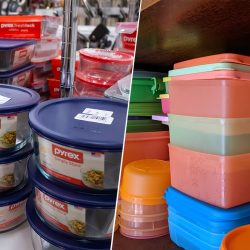Finding bugs in your pantry is a big problem. Once a bug infestation begins, it seems like you can't get rid of these pests no matter how hard you try. You may even feel like tossing everything from your pantry into the trash. How else can you possibly eliminate these pesky intruders for good? If you are looking for an answer to this question, look no further! Our in-depth research into getting rid of pantry bugs naturally will answer all of your questions!
When trying to get rid of pantry bugs naturally, you should do the following:
- Check all the food in your pantry for any signs of bugs. Throw out any food with visible bugs. Additionally, throw out any open packages.
- Vacuum and wipe down your pantry
- Remove trash from your home immediately
- Use natural pest traps
- In the future: store food properly, use natural bug repellents and keep your pantry clean.
This is a lot of information, and it may seem a bit overwhelming. Thankfully, we'll go into all the necessary details in this post to ensure that your pantry can become bug-free, and stay that way!
![A pantry with jar filled with different ingredients and spices for cooking, How To Get Rid Of Pantry Bugs Naturally [5 Crucial Tips]](https://kitchenseer.com/wp-content/uploads/2020/09/How-To-Get-Rid-Of-Pantry-Bugs-Naturally-5-Crucial-Tips.jpg)
How Can I Get Rid of Pantry Bugs?
When finding bugs in your pantry, undoubtedly, the first thing you want to do is get them out! Follow these steps to ensure you rid your pantry of these unwelcome guests!
Throw Out Infested Food and Opened Packages
The first thing you want to do when you see bugs in your pantry is to check every item in your pantry. Yes, every single item. Even unopened items should be checked, as some bugs can chew through food packaging. It may be time-consuming, but it is the only way to ensure your pantry is bug-free!
Throw out all food items with any signs of bugs. Additionally, you should throw out any open packages, even if you don't see any visible signs of bugs. There may be larvae in the food that you aren't able to see!
Understandably, you may not want to toss every open package in your pantry and waste all that food. If this is the case, you can freeze these food items for 3-4 days to kill any larvae that may be hiding in them. Additionally, you can heat these food items at 130 degrees Fahrenheit for 30 minutes.
Clean Your Pantry From Top to Bottom
Remove everything from your pantry to allow for a thorough cleaning. Vacuum the shelves down to get rid of any crumbs, bugs, webs, or cocoons that might contribute to a re-infestation. Empty the vacuum cleaner into the trash immediately.
Then, wipe down your entire pantry, including any food packages you are keeping. You may wonder if a deep clean is possible without harsh cleaning products, but fear not! Many natural alternatives are perfectly safe to use in your pantry. One possible solution is to invest in any number of natural cleaning products. These products will be safe to use in both your pantry and kitchen.
One such product is Better Life's cleaning spray:
Check out this product on Amazon.
Another example is Mrs. Myer's cleaning spray:
For more details, click to view this product on Amazon.
Another alternative is to make a natural cleaning solution out of equal parts non-toxic soap, vinegar, and water. This works as a good cleaner, as well as a natural bug repellent.
Remove Trash Immediately
The next step is to tie your trash bag tightly and remove it from your house. Keeping it indoors can lead to a re-infestation as bugs can get out and enter your pantry once again. Make sure you wipe down your trash can after removing your trash. If you put any food into your garbage disposal, run the disposal with hot water for one minute.
Use a Natural Pest Trap
For specific pantry bugs, like pantry moths, you can invest in a safe sticky trap. These traps eliminate moth infestations by attracting the males through a release of pheromones. This keeps the male moths from breeding and creating larvae. Check out this sticky trap from Greener Mindset on Amazon.
Click here to see this on Amazon.
How Do You Kill Spice Bugs?
While not everyone keeps their spices in their pantry, they are not immune to "pantry bugs." You can kill spice bugs, much like the bugs you find in your pantry products. Spice bugs are not harmful, but you should still try not to consume any infested spices.
To kill these bugs, freeze the spice for four days. This will kill any bugs and larvae. Then, toss the spice into the trash. You can set up sticky traps with pheromones similar to the ones used for moths. Set these traps around your spices to keep infestations at bay. You can also make sure to store spices in airtight containers to keep bugs out.
How Can I Prevent Pantry Bugs?
Once you have done all the work to eliminate these pests from your pantry, you may be wondering how you can keep this from ever happening again. There are several ways to prevent pantry bugs from becoming a problem in the future.
Store Food Properly
Specific pantry bugs can chew their way through paper, cardboard, plastic, and even burlap. To make sure bugs stay out of your food, store food in airtight containers. The foods most likely to be infested are grains, cereals, nuts, spices, dry pet food, and dried fruits. Therefore, you should primarily focus on storing these food items properly. There are many options for airtight food containers, such as these from Chef's Path:
Click to view this product on Amazon.
If you don't want to store all of your food in airtight containers, you should try to keep food in a cool, dry place. Try only to buy small packages of food that you will be able to use in 2-4 months. The longer food sits in your pantry, the more susceptible it is to a bug infestation.
If you have any room in your freezer, you can also store food there. This will ensure that no bugs can get inside and lay eggs. For more food tips, storage suggestions, check out this article.
Can Pantry Moths Get Into Tupperware?
Investing in numerous new airtight containers can be costly. You may be wondering if the Tupperware containers you already have can keep out pesky bugs like pantry moths.
To keep bugs out of your food, its container must be airtight. Tupperware is all marketed as being airtight; however, some Tupperware containers can become warped in dishwashers or through extensive use.
If you are unsure whether your Tupperware is truly airtight, try this test. Put a substance in your Tupperware that is obvious when it is wet, such as flour or sugar. Submerge your Tupperware in water to see if any water can get in. If water cannot get in, chances are bugs can't either. If your Tupperware is airtight and closed properly after every use, bugs like pantry moths should not be able to get in.
Use Natural Bug Repellents
To make your pantry less enticing to bugs, there are several natural bug repellents that you can use. You can hang a sachet of bug-repelling scents such as bay leaves, cedar chips, rosemary, or lavender. You can also use essential oils as a bug repellent spray. Lavender, lemongrass, citrus, peppermint, eucalyptus, tea tree, citronella, and catnip are all examples of essential oils with insect repellent capabilities. To make an essential oil bug repellent, mix 25-30 drops of essential oil with 1 cup of water. Place this mixture into a spray bottle and spray as needed.
Keep Your Pantry Clean
You should be sure to clean up any spilled food in your pantry as soon as possible. This will reduce the risk of another infestation. It is also essential to give your pantry a thorough clean every 3-6 months. Doing this will ensure that you eliminate any crumbs or possible bugs before they can cause a problem.
Should I be Worried About Pantry Bugs?
The thought of unknowingly eating bugs can make your skin crawl. But should you be worried if you think you may have ingested pantry bugs? Let's talk about what kind of bugs you may see in your pantry and whether they are a threat to your health.
What Kind of Bugs Get in Your Pantry?
There are several different kinds of bugs you may find in your pantry. Common bugs include moths, beetles, weevils, and ants. Some bugs, like moths and ants, can get into your food from the outside and use it as a nest to lay eggs.
For some pantry bugs, like weevils, their eggs may already be in your food when you buy it. While this news may turn your stomach, it is not a threat to your health.
Some other bugs that can make their way in your pantry are cockroaches and spiders. Thankfully, these bugs are less common in terms of a pantry infestation.
Are Pantry Bugs Harmful if Eaten?
As gross as the thought of eating a bug might be, there are no known health risks to ingesting most pantry bugs. The most common pantry bugs (such as pantry moths and weevils) are not known to spread any parasites, diseases, or parabens.
Should I Throw Out Flour With Weevils?
So if these bugs aren't harmful, do you have to throw out your food? It can be a pain to have to toss an entire bag of flour because of a few weevils. It turns out, these beetles are quite common, and chances are you have unknowingly consumed a few weevils in your life.
In the case of a light infestation, you can safely consume weevils. However, if there is a large and noticeable infestation, it is recommended that you throw out the flour, as eating weevils in large quantities could pose some health risks.
If you are worried about consuming weevils in flour, you can always freeze or heat your flour, as mentioned above. Just make sure not to heat your flour on its own in a microwave as you could start a fire!
Enjoy Your Bug-Free Pantry!
As long as you follow the tips and suggestions in this article, you should get rid of those pesky pantry invaders and keep them out for good! Hopefully, this article helped answer all your questions on pantry bugs and how to deal with them!
Keep in mind that when it comes to pantry bugs, prevention is key! We recommend making sure you have the proper food storage practices. For a list of some excellent food storage containers, check out this article!






![Glass and plastic Tupperware containers, How To Clean Tupperware Oil Containers [6 Helpful Cleaning Solutions]](https://kitchenseer.com/wp-content/uploads/2022/06/Glass-and-plastic-tupperware-containers-250x250.jpg)

![A set of tupperware products on a dark background, How To Get Stains Out Of Tupperware [3 easy methods]](https://kitchenseer.com/wp-content/uploads/2020/09/A-set-of-tupperware-products-on-a-dark-background-250x250.jpg)

![A contemporary classic kitchen renovation remodeling featuring a pantry storage shelf and maple cabinet, Why Does My Pantry Smell Bad? [And How To Fix That]](https://kitchenseer.com/wp-content/uploads/2020/08/A-contemporary-classic-kitchen-renovation-remodeling-featuring-a-pantry-storage-shelf-and-maple-cabinet-250x250.jpg)